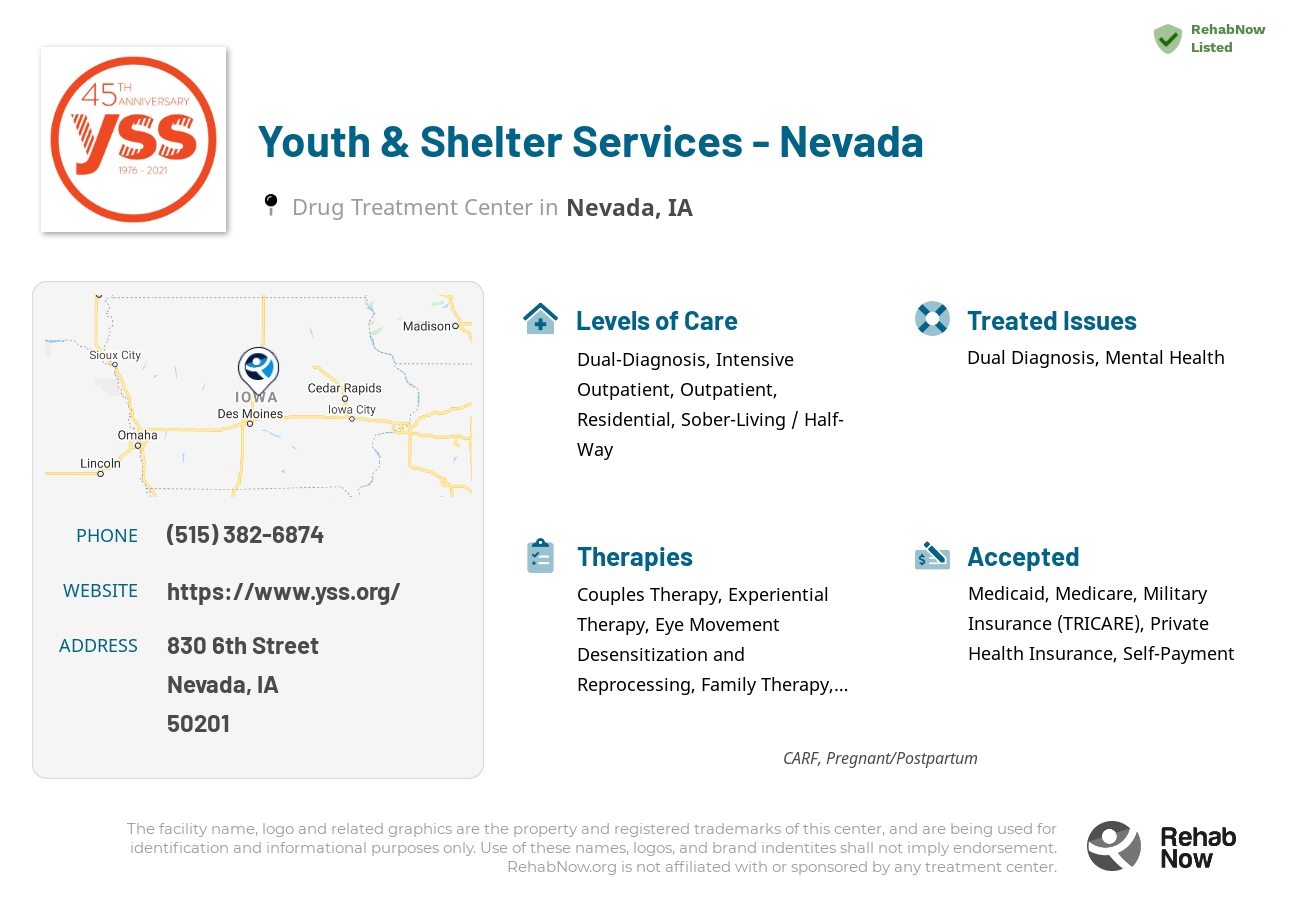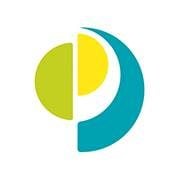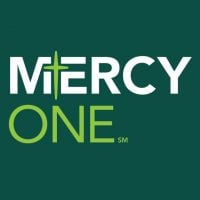Youth & Shelter Services - Nevada
Drug Rehab Center in Nevada, Iowa
Youth & Shelter Services - Nevada, located in Nevada, Iowa, provides enhanced care, support, and advocacy for families and children of all ages in their community, specializing in providing resources and support to victims of abuse, addiction, and trauma.
About Youth & Shelter Services - Nevada in Iowa
Youth & Shelter Services - Nevada, located in Nevada, Iowa, is an addiction treatment facility founded in 1976. This facility specializes in providing treatment for individuals suffering from dual diagnosis and mental health disorders. They offer a wide range of levels of care, including dual diagnosis, intensive outpatient, outpatient, residential, and sober-living/half-way programs. Youth & Shelter Services - Nevada is accredited by CARF, which ensures that their programs and services meet high quality standards. They accept private health insurance and are affiliated with Youth & Shelter Services, a reputable organization dedicated to helping young people overcome challenges and lead healthier lives.
Youth & Shelter Services - Nevada offers a comprehensive range of services for addiction and substance abuse. Through their dual diagnosis program, they address the complex needs of individuals who struggle with both addiction and mental health disorders. Their intensive outpatient program allows individuals to receive treatment while living at home, providing flexibility and support in the recovery process. Their residential program provides a structured and supportive environment for individuals in need of more intensive treatment. Additionally, they offer outpatient services for those who require less intensive care. With their sober-living/halfway program, Youth & Shelter Services - Nevada helps individuals transition from residential treatment to independent living while maintaining a sober lifestyle. Overall, they provide a continuum of care to meet the unique needs of each individual seeking treatment for addiction.
Genders
Ages
Modality
Additional
Accreditations

CARF
The Commission on Accreditation of Rehabilitation Facilities (CARF) is a non-profit organization that specifically accredits rehab organizations. Founded in 1966, CARF's, mission is to help service providers like rehab facilities maintain high standards of care.
Conditions and Issues Treated
Individuals who are addicted to drugs and/or alcohol often have one or more co-occurring mental health disorders. Addressing both the addiction and the mental health problems at facilities like Youth & Shelter Services - Nevada can be very beneficial for these individuals.
Common mental health conditions that often co-occur with addiction include:
- Anxiety Disorders – People with drug and alcohol problems often suffer from anxiety disorders such as panic disorder, obsessive-compulsive disorder, social anxiety disorder, and generalized anxiety disorder.
- Depression – One of the most common mental illnesses co-occurring with addiction is major depressive disorder.
- Attention-deficit hyperactivity disorder (ADHD) – Many people with drug and alcohol problems also suffer from ADHD.
- Bipolar Disorder – People with bipolar disorder are more likely to suffer from drug and alcohol problems than the general population, and vice versa.
Levels of Care Offered
This center offers a variety of custom treatment tailored to individual recovery. Currently available are Dual-Diagnosis, Intensive Outpatient, Outpatient, Residential, Sober-Living / Half-Way, with additional therapies available as listed below.
An intensive outpatient treatment program, or IOP, is set up for those struggling with an addiction to begin the recovery process. However, the patient will not live at the facility during treatment.
IOP involves patients coming in and out of a medical office building regularly to receive therapy and other services while continuing their life outside of these visits.
IOP is a step up from drug detoxification or alcohol detox. However, it’s still considered a phase of recovery rather than the ultimate goal. There are many rehabs and treatment facilities available to patients in need of IOP.
Outpatient treatment can be considered the lowest intensity level of addiction treatment in Nevada, IA. It is ideal for early phase addiction or lower intensity addictions. Youth & Shelter Services - Nevada peer group support, 12-step programs, and individual counseling are likely to be involved.
Sober living homes are transitional houses for recovering addicts who need more structure than they would receive in an aftercare program. Specific rules and regulations are enforced in these homes, which are beneficial for people who need a greater degree of structure than other types of treatment.
Sober living home options include:
- Live-in managers – might be beneficial to people who do not have a support system in place at home, or who experience high levels of stress between work and home life.
- House managers – House managers are beneficial for people who do not have a strong social network to rely on, or who are concerned about relapse in their daily lives.
- House parents – House parents are beneficial to people who reside in areas without a strong aftercare program for support.
Residential treatment programs are those that offer housing and meals in addition to substance abuse treatment. Rehab facilities that offer residential treatment allow patients to focus solely on recovery, in an environment totally separate from their lives. Some rehab centers specialize in short-term residential treatment (a few days to a week or two), while others solely provide treatment on a long-term basis (several weeks to months). Some offer both, and tailor treatment to the patient’s individual requirements.
Therapies & Programs
Individual therapy is ideal for addicts who want to focus on themselves. It can also be helpful for those whose withdrawal symptoms are exacerbated by the presence of other people.
Benefits of individual therapy are:
- Access to a personalized treatment plan that focuses on the individual needs of the addict
- More privacy during treatment sessions
- Better personal development through introspection
- Increased self-awareness regarding addictive tendencies in order to avoid relapse
- Greater potential for a long-term recovery plan
- Receiving professional advice and detox assistance from medical staff
Couples therapy is a treatment method used to help couples in which at least one member of the couple has a drug addiction. Couples therapy can be used whether the addicted partner is using drugs or in recovery. An additional benefit of couples therapy is that it can help make other types of treatment, such as 12-step programs, more effective.
Family therapy can help you and your family deal with old issues that may trigger substance abuse. The idea behind family therapy for drug addiction is that you are never fully healed from substance abuse until you’ve healed your relationship with your family, too. To get sober, you need to find a different way to cope with the pain in your life.
This is when a group of people in various stages of recovery meet up and discuss their experiences, triggers, successes, failures, and even alternative therapies! Unlike support groups where everyone already knows each other, group therapy is conducted along side outpatient or inpatient treatment at Youth & Shelter Services - Nevada.
Trauma therapy is a clinical process that helps individuals deal with mental stress often caused by traumatic events. The therapist helps the person identify, understand and work through the problem. This is done with the help of talking about it in group or one-on-one counseling sessions.
Therapists use relaxation, role-playing, art, and music to help the person open up about what is bothering them. Some examples include:
- Talking about the traumatic event and how it affected them.
- Helping those who have PTSD to deal with their nightmares and recurring memories.
- Working with individuals to resolve the issues triggering the stress, whether seeing someone who reminds them of what happened or feeling helpless.
The individual is also encouraged to help others that are struggling with similar problems. This often helps them feel empowered and gives them hope.
Trauma therapy is not for everyone; it is usually reserved for people who have recently experienced a traumatic event and struggle to get over it. It is generally done for children, teenage victims of sexual assault, and war veterans.
CBT is a psychotherapy approach and method. [ws-nap-name] people to examine how their thoughts, including habitual harmful and inaccurate thinking, affect their actions. CBT is based on the idea that rigid, inflexible thinking leads to poor stress management, which leads to emotional distress.
Similarly, CBT helps people identify and change negative behaviors. It makes you question your perceptions and ask if they are realistic. CBT asks people to examine their behaviors and emotional responses and how they affect their lives. CBT aims to change people’s thinking and behavior to lead a more balanced and healthy life.
Moreover, CBT has been shown to reduce anxiety disorders, depression, and symptoms associated with harmful thoughts or actions.
Eye Movement Desensitization and Reprocessing (EMDR) therapy is a treatment method that helps reduce the impact of traumatic memories on individuals. It involves following a bar of light or watching a therapist’s finger move back and forth. This mimics the eye movements of REM sleep, which allows the brain to reprocess memories. EMDR therapy is combined with behavioral therapies to address the root cause of the problem. This reduces the desire to escape painful memories with drugs.
EMDR is effective in reducing the craving one experiences while being treated for drug addiction. Studies have shown that patients who undergo this therapy use drugs less and stay sober for more extended periods than those who do not. It is also more beneficial than talk therapy and medication. This can be performed in combination with medications to reduce the adverse side effects. While some believe that it does not treat the root cause, studies have shown that therapy combined with medication brings in better results.
Those struggling with addiction can benefit from learning certain life skills. It is not as simple as quitting drinking or taking drugs and thinking that the hard part is over. Being sober means living a whole new way of life. Many recovering addicts have found that they need to develop talents like time management, organization, communication skills, socialization skills, and self-esteem to make their life in sobriety work, Youth & Shelter Services - Nevada is here to help with that.
Patient Experience
Experiential Therapy at Youth & Shelter Services - Nevada
Experiential Therapy is a type of therapy that involves activity to recreate situations that may have caused trauma or negative emotions. Experiential therapy at Youth & Shelter Services - Nevada in Nevada, IA can involve acting, props, arts and crafts, animal care or other tools that may be effective. This therapy is done on an individual basis and can help revisit and heal from past traumas. Trust between the therapist and individual is important for success. Experiential therapy can help you more closely become you and move through life positively and authentically.
Payment Options Accepted
For specific insurance or payment methods please contact us.
Is your insurance accepted?
Ask an expert, call (888) 674-0062
Youth & Shelter Services Associated Centers
Discover treatment facilities under the same provider.
- YSS - Youth & Shelter Services - Family Counseling & Clinic in Ames, IA
- YSS - Youth & Shelter Services - Francis Lauer Youth Services in Mason City, IA
- Youth & Shelter Services - Marshalltown in Marshalltown, IA
- YSS - Youth & Shelter Services - Youth Recovery House in Ames, IA
- YSS - Youth & Shelter Services - Juvenile Court Services in Des Moines, IA
Learn More About Youth & Shelter Services Centers
Additional Details
Specifics, location, and helpful extra information.
Nevada, Iowa 50201 Phone Number(515) 382-6874 Meta DetailsUpdated November 25, 2023
Staff Verified
Youth & Shelter Services - Nevada Patient Reviews
There are no reviews yet. Be the first one to write one.
Nevada, Iowa Addiction Information
Iowa ranks 2nd lowest in the nation for illicit drug use, but 12% of its residents are still using these drugs every single year. Methamphetamines account for more than 90% of all drug-related prison admissions in Iowa. Alcohol is the most widely abused substance in the state, with 23% of residents admitting to heavy drinking.
Treatment in Nearby Cities
- Audubon, IA (79.0 mi.)
- Webster City, IA (36.3 mi.)
- Belle Plaine, IA (61.1 mi.)
- Decorah, IA (122.8 mi.)
- Keosauqua, IA (118.0 mi.)
Centers near Youth & Shelter Services - Nevada
The facility name, logo and brand are the property and registered trademarks of Youth & Shelter Services - Nevada, and are being used for identification and informational purposes only. Use of these names, logos and brands shall not imply endorsement. RehabNow.org is not affiliated with or sponsored by Youth & Shelter Services - Nevada.











